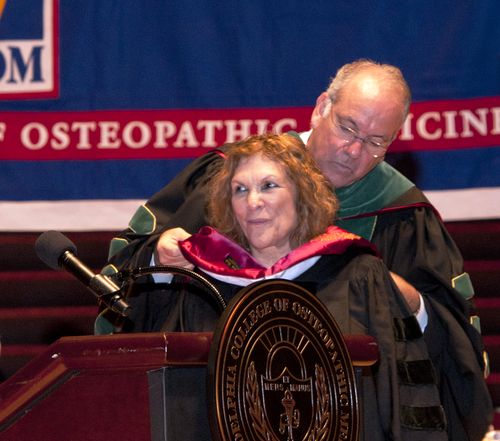
Last month, Edna Foa, world renowned for being the creator of prolonged exposure therapy, a treatment for post traumatic stress disorder (PTSD) whereby patients revisit the traumatic event in order to help them heal, received her second honorary doctorate degree for her work in psychiatry—a career that spans four decades.
“In recognition of her important contributions to the field of clinical psychology and her service as a role model for psychology students in training, the Philadelphia College of Osteopathic Medicine (PCOM) is proud today to bestow an honorary degree on Dr. Edna Foa,” the announcement read.
Indeed, her groundbreaking work has changed the lives of members of military, young victims of rape and other traumatic events. Time magazine even named her one of the 100 Most Influential People of 2010.
Foa was born and raised in Israel. She came to the U.S. in her early 20s. Her husband, an established psychology professor in Israel, was recruited to teach at the University of Illinois. She went to college in Israel, also studying psychiatry, an interest sparked by work she did in her late teens with delinquent youth.
In Illinois, she continued her studies at the nearby University of Missouri, earning a PhD in psychology. Her husband was then recruited by Temple University and the family moved east. Prior to moving and armed with a PhD and ready to start her career, Foa reached out to Temple psychologist, Joseph Wolpe, an early leader in the practice of cognitive therapy. She subsequently completed a post-doctoral fellowship with Wolpe and gained exposure and expertise in working with patients with anxiety disorders. She was then brought on to the Temple faculty and began her career in academia, as a professor of psychology.
Her early research centered on obsessive-compulsive disorder (OCD). She set out to understand what component(s) of OCD treatment had the most effect on patients’ outcomes. Foa then turned toward understanding why and how some people do—and do not—overcome traumatic events. The concept of PTSD had only been roughly defined and there were no treatments yet for this developing disorder.
Foa started working with rape victims to help them overcome the trauma. To date, victims of trauma had really only received psychological treatment as though they had a phobia of the people and places often responsible for the trauma. For example, rape victims were thought to have developed a phobia of men, evenings, nightclubs and dimly-lit places. Foa took a new approach that would help patients find a long-term solution to their post-traumatic stress through a greater understanding of how PTSD takes root and the skills patients needed most to break free from its control.
Instead of avoiding the traumatic memory, Foa taught patients to revisit the trauma and get a new perspective on the incident—known as prolonged exposure therapy.
“Most people hold themselves responsible for a traumatic incident,” she says. “Through reliving the trauma, they are able to see that they had no other option and form a new memory of the incident.” Reliving the trauma, many experts once thought, would bring back the same traumatic memory and cause undue harm to patients.
Foa took a different approach through a better understanding how a traumatic memory is processed and the pathology of PTSD. She learned that by giving patients exercises to slowly re- “expose” them to the trauma in a formal and systematic they could achieve long-term results.
She received a grant from the National Institutes of Health to compare prolonged exposure to counseling and other treatments for PTSD. Her studies showed that it provided superior results to counseling alone.
Foa then extended her work beyond rape victims.
Prolonged exposure therapy is now the preferred treatment for the military in helping soldiers overcome PTSD from battle. She continues to work with the Department of Defense to provide new ways to deliver prolonged exposure therapy for the best results. The therapy has also proven successful in helping PTSD sufferers overcome the disorder in addition to the alcohol and tobacco use that so often accompany it.
Prolonged exposure therapy is also at work right here in Philadelphia. Foa and her team are training therapists and counselors in community mental health centers throughout the city to help children and adults work through their PTSD for long-term results.
She continues to get the word out about the power of prolonged exposure therapy, which she has been perfecting since her career began in the late 70s. She has received many awards for her contribution to the field, including her first honorary doctorate degree from the University of Basal in Switzerland.